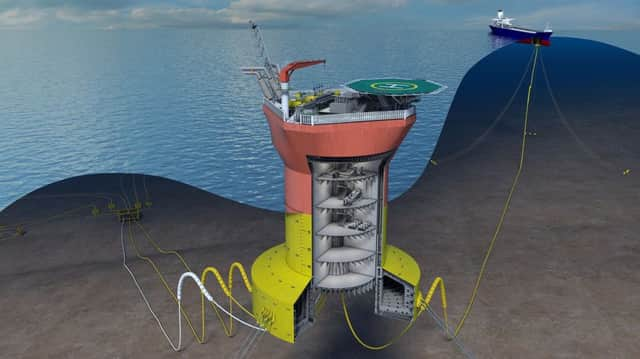Oil firms think small in bid to extract billions of pounds from North Sea


Crondall Energy and the Oil & Gas Technology Centre (OGTC) have joined forces with international oil and gas firms to explore whether a compact, moveable and remotely operated buoy could help extend North Sea oil production – and remove the need to send workers into the hostile North Sea environment.
There are 360 small pools – or marginal fields – off the coast of the UK which hold an estimated 3.2billion barrels of oil equivalent (BOE).
Advertisement
Hide AdAdvertisement
Hide AdReaching the small pools has been a challenge for the industry given the often complex nature of the oil reservoirs and the high degree of production uncertainty.
Crondall Energy have now designed a floating Normally Unattended Installation (NUI) which will be tested and reviewed in the North East following major industry sponsorship.
Duncan Peace, managing director of Crondall Energy, which has patented its floating production concept, said new automation technology was playing a “critical role” in reducing the size and cost of offshore facilities as well as the man-hours required to run them.
He said: “What makes our concept unique is the integration of these process and automation technologies with Crondall’s patented floating production concept, to deliver a material reduction in both the size of facilities and the level of manning. Together these innovations offer the opportunity to deliver a step change in lifecycle economics.”
The study is the first major project of the OGTC’s Facility of the Future programme with the NUI study financially backed by companies including Premier Oil, Total E&P UK, Lloyds Register, Siemens, Wärtsilä, Ampelmann and BW Offshore.
The project aims to confirm that such remote operations are viable in the face of maintenance requirements and production times.
Many small pools lie at greater depths and at harder to reach locations, away from existing oil and gas infrastructure.
At present, operators are typically only working on one or two pools each despite the opportunity they present.
Advertisement
Hide AdAdvertisement
Hide AdThe study will look at how the NUI can operate in a field in the northern North Sea, in 150m water depth, producing 20,000 barrels of oil a day.
The joint-industry review will also seek to demonstrate that NUIs can offer improved performance and lower life-cycle costs.
Chris Pearson, marginal discoveries solution centre manager for the Oil & Gas Technology Centre, said: “Marginal discoveries represent a significant opportunity to maximise economic recovery from the UKCS, but we need a new, smarter approach to field developments if we’re to make it a reality.
“We’re excited to be working with Crondall and our industry partners on the study, which will help transform the future of the oil and gas industry and those working in it.”
While an offshore workforce will not be required to operate the NUI, it is anticipated the new technology will create skilled onshore jobs.
The study will be conducted in two phases over eight months to look at technical and commercial feasibility.
Craig Matthew, asset & development manager for Premier Oil, said “Premier, as an independent offshore operator, is delighted to be supporting this study.
“The development of innovative concepts such as these are critical to maximising economic recovery from the UKCS and ensuring that its full potential is realised.”